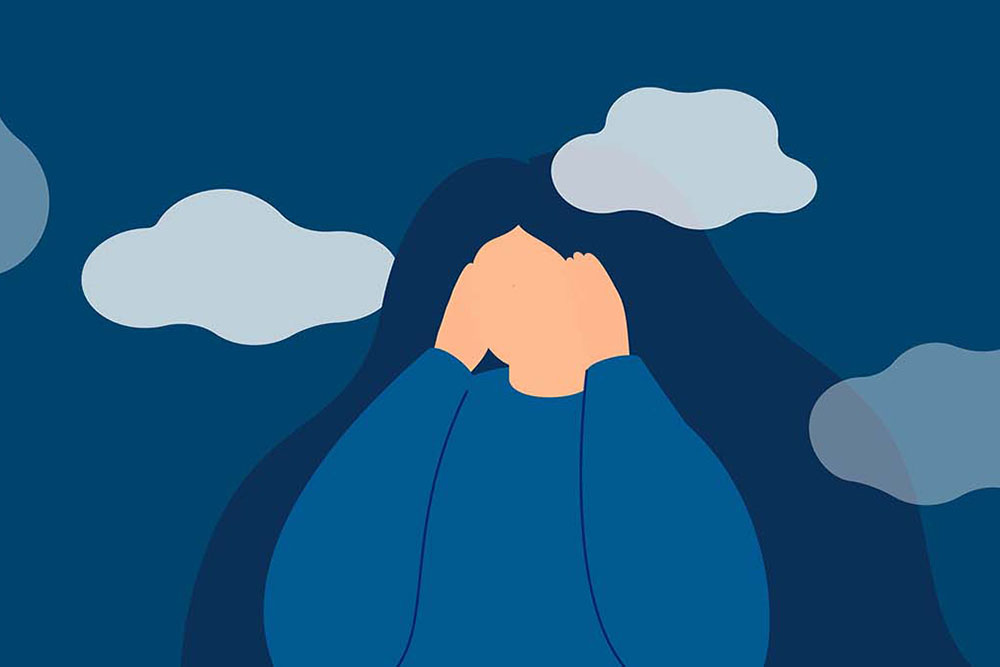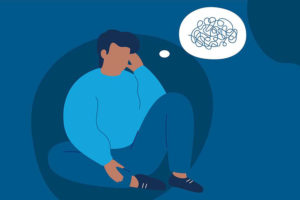By the age of sixteen when I received my driver’s license, I had been experiencing chronic (and even daily) migraine attacks for twelve years. I had lived in the same city for most of that time, but it seemed like I was getting lost easily when I started driving on my own. It was as if on certain days, my sense of direction would just leave me. There were even days I could drive to a certain place, but then I would have trouble getting home. Since then, I’ve been lucky on two counts: 1) I have a great sense of humor, and 2) eventually Google Maps was invented.
I learned a new vocabulary word while writing this article… obnubilation: the obscuring or dimming of awareness or mental faculties1. (It seems there is a scarcely used medical term for practically everything.) In the migraine community, we know this as “brain fog” or cognitive impairment. Migraine used to be essentially constant for me, but brain fog was not very predictable. My migraine experiences are much less frequent now, and I can often tell when a migraine is coming because, for me, brain fog comes first.
Cognitive dysfunction is the most common complaint made by people with migraine in the prodrome and headache phases of migraine2. It should be noted that there is not a ton of data in this area of migraine research, and the story is, well, a little foggy. Usually I know when the brain fog has kicked in for me because I find myself staring into space or wandering the house. I lose my “plan” for the day. I may forget what I was doing or have a lot of trouble focusing on tasks. I have come up with ways to work around this. But historically, I would spend hours on tasks that should have taken me half as long.
What does the research say about migraine brain fog?
It should be pointed out that approximately one third of studies on this topic did not find an association between migraine and cognitive impairment3. However, this may have been due to methodological differences and the possibility that only those with more severe neurological involvement experience this problem3. Where the data conflicts most is in the determination of whether cognitive dysfunction is a problem in the interictal phase, meaning between migraine attacks. It has been much easier to prove that cognitive impairment exists during the active phases of a migraine attack3. There is also some indication that cognitive impairment increases with the frequency of a person’s migraine attacks4.
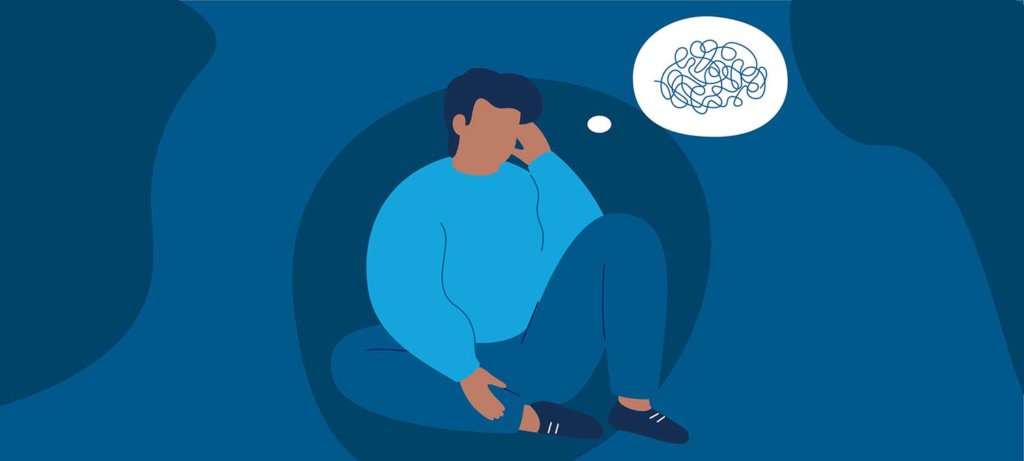
Symptoms of migraine brain fog
We do know that the changes that are reported most often are impaired visual and verbal memory, reduced information processing speed, executive dysfunction (impairments in goal-directed behavior like planning, motivation, and multi-tasking), and attention deficit. We also know that these issues are not entirely related to the pain process, and affect people with migraine more than those with tension type headache3. In other words, if the migraine pain was not distracting enough, it seems there may be an underlying process in the central nervous system causing migraine-related brain fog.
If you are a person who experiences vertigo with your migraine (or a sensation of the world moving around you when it is not), or who has vestibular migraine, studies show that brain fog can be even more troublesome for you. There is some evidence that people with migraine-associated vertigo experience more pronounced cognitive impairment than other people with migraine 5, and the severity of dizziness is associated with the severity of cognitive impairment6.
Many of these difficulties are more pronounced in those of us who experience migraine with aura than migraine without aura3. There are two other rarely used words I noticed while writing this article. I noticed them because of how much they have affected me over the years: anomia (impaired recall of the names of people or everyday objects without impairment in comprehension) and prosopagnosia (face blindness, or impairment in the ability to recognize faces while other aspects of visual and intellectual functioning remain intact). These are two phenomena that are found to occur in people diagnosed with migraine with aura, but less so in migraine without aura3.
A more recent study showed evidence that there is a decline in something called attentional inhibition, which can be regarded as the ability to suppress brain functioning that is irrelevant to the task at hand, and ignore components of a situation that do not matter to your current goal7. This would clearly affect focus and attention. Another recent publication notes that there are impairments in metacognition in people with migraine when compared to control subjects4. Metacognition is a word used to describe our awareness and understanding of our own thought processes. Metacognition is particularly important in higher-level executive functioning. If you have problems with metacognition, you may have problems planning your approach to a problem or evaluating your own progress toward a goal.
Lastly, some of the medications we take to help with our migraine can bring significant cognitive side effects of their own. Topiramate is most well-known for this8,9. Some people may find this extra medication-related problem very difficult if they already experience cognitive difficulties related to their migraine.
So what can we do?
I find it helpful to learn that these things can happen, so that we recognize them in ourselves when and if they occur. Brain fog is a symptom of migraine and it is not your fault. Recognizing the problem allows us to integrate strategies into our lives to help us overcome (or make up for) the brain fog challenge. Sharing this information with others in your life may also help them understand and possibly be more supportive and helpful to you.
Here are some ideas that I have found to help people, including myself, stay focused and accomplish goals despite migraine and migraine-related brain fog.
1. Make your to-do lists in advance
Make your task lists (for work and for your personal life) the night before. You are under less pressure at this time.
Key: Flag which tasks require the most and the least mental energy. This way, you know which tasks to switch to if you have a “foggy” day. Switching between tasks when your brain starts feeling “foggy” can keep you from wasting your day away.
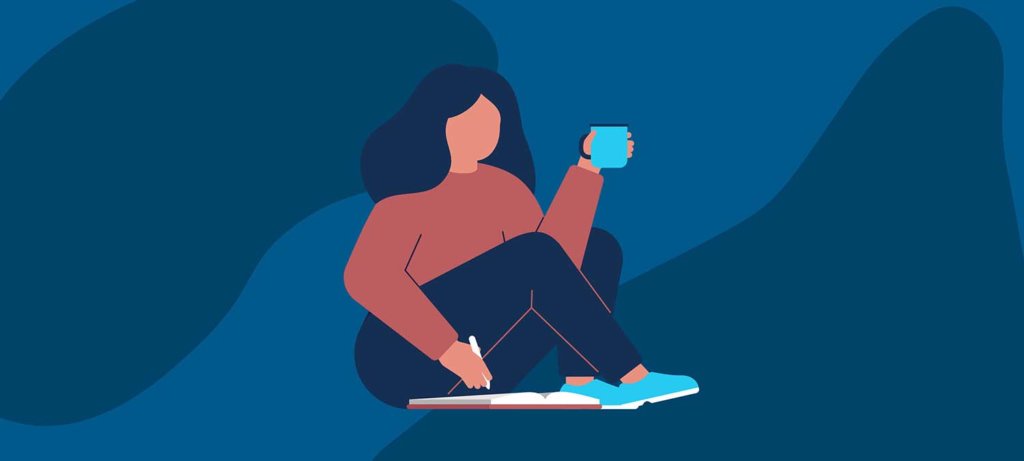
2. Track your time
Keep track of all the hours of your day – write down everything you do on an online calendar or in a planner.
Key: Are you a visual person? Pick a color for each category of your day and color the hours of your calendar. Pick a shade for brain fog. How many hours did you spend in “brain fog”? What were the tasks you were trying to complete during this time?
If necessary, go back and double check the tasks you were doing during the brain fog hours. Is there a pattern? Does your brain fog come at a certain time of day/week/month/year or in a certain phase of your migraine cycle? This information might help you plan your schedule.
This can help you discover if you spent too much time on a task. Was it because you were not thinking clearly?
3. Use memory hacks
If you are meeting new people and know you have difficulty remembering faces or names, focus on something really memorable and associate it with their name.
Key: Do they have an unusual voice? Memorable eyes? Prominent cheekbones? Interesting eyebrows?
Be careful how much you focus on hair color in case it changes! Also, I’ve gotten myself into a lot of trouble by memorizing facial hair – it can be shaved off or altered!
4. Walk around
In fact, sometimes this is how I discover I am in a fog – I find myself wandering around.
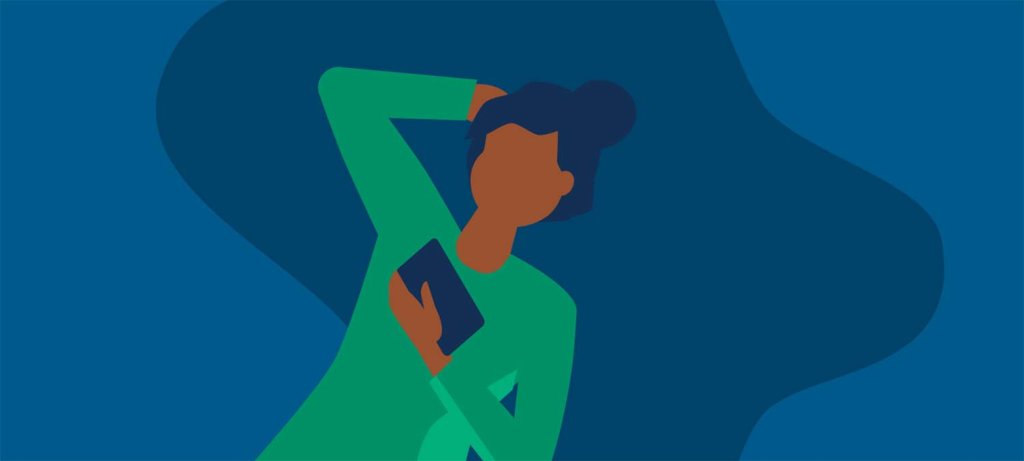
5. Do some light exercise to clear your mind
Do some yoga poses or stretches, breathing exercises, meditation or use another relaxation app on your phone to clear your mind and refresh yourself.
If you are able to increase blood flow and oxygen through low-grade aerobic exercise, this may be helpful10.
Of course, the best way to avoid migraine-related brain fog is to decrease the frequency and severity of migraine attacks in your life. Check in regularly with your healthcare provider or headache specialist to make sure you are on the best preventive and acute medication and non-medication regimen for you, and that you are utilizing the best adjuvant treatments and lifestyle interventions. Find out if any of your medications may be contributing to your cognitive difficulties and if so, see if any changes can be made.
We do not need to be victims of our migraine disorder or the brain fog it can bring. Planning for our low-functioning moments during our high-functioning moments can make all the difference for us, our productivity, and our sense of empowerment and well-being.
Juva Health: Biofeedback for Migraine
The Juva Health app teaches you migraine progressive muscle relaxation along with other science-backed migraine relaxation, stress management, and CBT techniques. Using unique technology, Juva makes it possible for you to learn and practice biofeedback for migraine prevention at home. The Juva app uses your phone’s technology to help make you aware of your bodily functions, like heart rate and respiratory rate.
To get access to the best relaxation strategies for migraine, including progressive muscle relaxation, sign up for a free year of Juva Health today.
Resources
1Collins English Dictionary: https://www.collinsdictionary.com/us/dictionary/english/obnubilation (Accessed 4/11/2022).
2Gil-Gouvia R. Martins IP. Cognition and Cognitive Impairment in Migraine Curr Pain Headache Rep. 2019 Sep 11;23(11):84.
3Martins de Araujo C, Barbosa IG, Lemos SMA, Domingues RB, Teixeira AL. Cognitive Impairment in Migraine: A Systematic Review. Dement Neuropsychol. 2012 Apr -Jun;6(2):74-79.
4Zucca M, Rubino E, Vacca A, De Martino P, Roveta F, Govone F, Gai A, Caglio M, Gentile S, Giordana MT, Rainero I. Metacognitive impairment in patients with episodic and chronic migraine. J Clin Neurosci. 2020 Feb;72:119-123.
5Wang N, Huang H-L, Zhou H, Yu C-Y. Cognitive impairment and quality of life in patients with migraine-associated vertigo. Eur Rev Med Pharmacol Sci. 2016 Dec;20(23):4913-4917.
6Donaldson LB, Yan F, Liu YF, NguyenSA, Rizk HG. Does cognitive dysfunction correlate with dizziness severity in patients with vestibular migraine? Am J Otolaryngol. Nov-Dec 2021;42(6):103124.
7Su M, Wang R, Dong Z, Zhao D, Yu S. Decline in attentional inhibition among migraine patients: an event-related potential study using the Stroop task. J Headache Pain. 2021 May 3;22(1)34.
8Mula M. Topiramate and cognitive impairment: evidence and clinical implications. Ther Adv Drug Saf. 2012 Dec;3(6):279-89.
9Overeem LH, Raffaelli B, Mecklenburg J, Kelderman T, Neeb L, Reuter U. Indirect Comparison of Topiramate and Monoclonal Antibodies Against CGRP or its Receptor for the Prophylaxis of Episodic Migraine: A Systematic Review with Meta-Analysis. CNS Drugs. 2021Aug;35(8):805-820.
10Irby MB, Bond DS, Lipton RB, Nicklas B, Houle TT, Penzien DB. Aerobic Exercise for Reducing Migraine Burden: Mechanisms, Markers, and Models of Change Processes. Headache. 2016 Feb;56(2):357-69.
